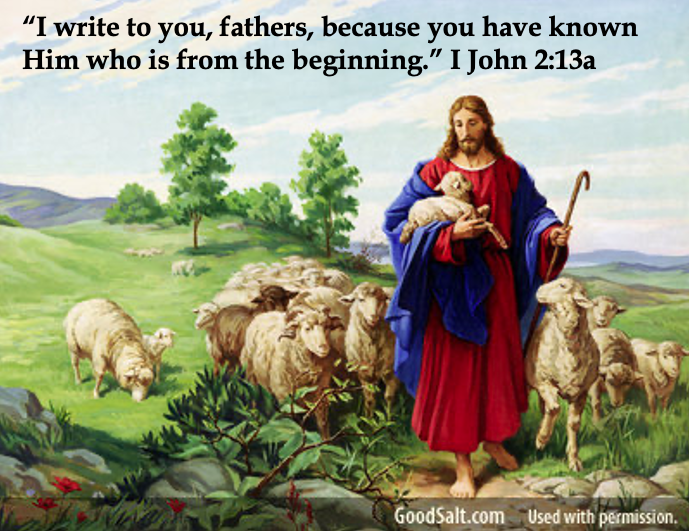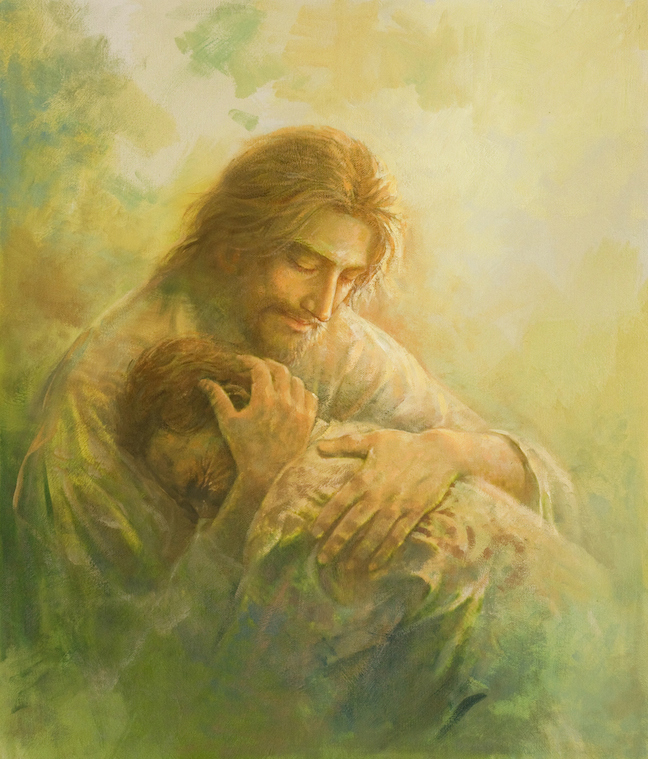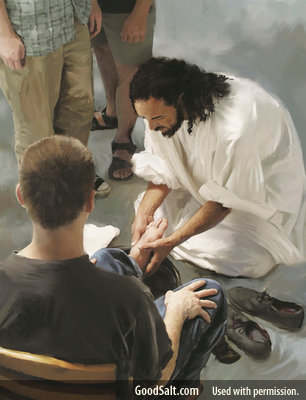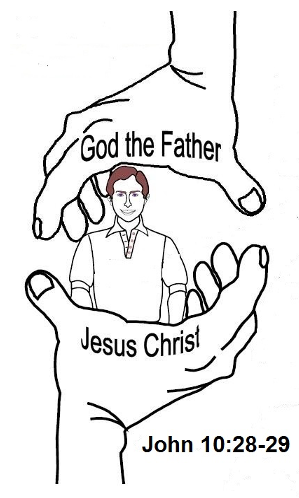“For if our heart condemns us, God is greater than our heart, and knows all things.” I John 3:20
God wants His born-again children to manifest their new righteous nature by loving their Christian brothers and sisters (3:10b-23). This Christian love is not like Cain who took his brother’s life (3:12); but it is like Christ Who sacrificially gave His own life for us (3:16). Jesus did not love us merely with words, but with actions. Likewise, Christians are to love one another “in deed and in truth” (3:17-18).
We may ask ourselves, “Am I really loving others the way Christ has loved me (3:16)? Can I even do that?” The apostle John reassures us, “And by this we know that we are of the truth, and shall assure our hearts before Him.” (I John 3:19). The words, “And by this” refer back to 3:18 and suggest that by loving others “in deed and in truth” (3:18) we can “know” (ginōskō) experientially “we are of the truth” (3:19a). This verse is not talking about assurance of salvation. To be “of the truth” (ek tēs alētheias) means that when a Christian engages in practical acts of love (3:17-18), he can know that his actions are sourced in the truth (3:19a). 1 It is talking about the assurance that we are experiencing “the truth” about love that is revealed in Christ (3:16-18). 2
“By practical acts of love in which the needs of others are met, Christians can have a basic assurance that they are participating experientially in the truth.” 3
So, as we grow in our love for others and practice it (3:17-18), we can assure ourselves that we are experiencing the truth about Christ’s love for us (3:19a). In addition, demonstrating love for others also increases our confidence before God in prayer. “And by this we … shall assure our hearts before Him” (3:19b). In the Greek of verse 20, the sentence begins with a repetition of the Greek word hoti (“For”) which connects verse 20 to verse 19. This word (hoti) could also be translated “that.” Hence, these verses would read, “19 and by this we … shall assure our hearts before Him 20 that [hoti] if our heart condemns us, that [hoti] God is greater than our heart, and knows all things.” (3:19-20). 4 By acting with love toward one another (“by this” – 3:19a), Christians can know they are experiencing the truth about love (3:19a) and quiet their condemning hearts (3:19b-20). 5
Sometimes when we kneel before the Lord in prayer, we may feel like failures trying to love one another compared to how Jesus has loved us without limitations. We may have a sensitive conscience that condemns us for having done too little, or for not making up for past failures. Our sinful flesh may even suspect ourselves of impure or unworthy motives when we try to love others. This kind of self-condemnation can lead us to think that God could never answer our prayers. No doubt, Satan, who is the accuser of believers (Rev. 12:10), is happy to see Christians approaching God in prayer with a condemning heart that lacks the assurance that God will answer their prayers. The Devil knows if this is not addressed, shame will set in and isolate the believer from God and others.
The Greek word translated “assure” (peithō) in 3:19 means “to convince, persuade, set at ease/rest.” 6 John counters a self-condemning heart by reminding us that “God is greater than our heart” (3:20a) which may forget how we have loved “in deed and in truth” (3:18) in the past. But what our heart does not take into account, God, Who “knows all things,” does take into account (3:20b). God is all-knowing whereas our hearts are not.
We can persuade or quiet our self-condemning hearts by embracing the truth that says, “God is greater than our heart” in that He “knows all” about how and why we have loved others in the past. Our self-condemning hearts do not have complete understanding of the thoughts and intents of the heart, but God does (Heb. 4:12-13). God remembers the times we have loved others even though our hearts may be inclined to ignore this. The apostle John does not want our critical hearts to keep us from approaching God’s throne of grace with confidence in prayer (Heb. 4:15-16). John wants us to remember that God takes into account, even if our heart does not, “all” that we have done for Him in love.
“Beloved, if our heart does not condemn us, we have confidence toward God.” (I John 3:21). When our condemning hearts are quieted 7 by resting on God’s knowledge of “all things” (3:20), we can come before God in prayer with a heart which “does not condemn us,” and then we can “have confidence toward God” (3:21). The word “confidence” (parrēsía) is the same word used in I John 2:28 which spoke of having confidence before Jesus at His coming. This word refers to “a state of boldness and confidence, courage… fearlessness, especially in the presence of persons of high rank.” 8 If Christians do not have confidence before God when they kneel in prayer now, they are even less likely to have such confidence before Christ when He returns. 9
Dr. Tony Evans tells the story of being in Columbia S.C. to preach at a crusade at the University of South Carolina’s football stadium. Twenty-five thousand people had gathered for the evening session, but news reports indicated a severe thunderstorm was on the way. In fact, the storm was expected to hit at 7:00 pm – the exact time the meeting was scheduled to start.
As the sky grew darker and darker, the organizers didn’t know what to do at first. Eventually, they called a prayer meeting. When the preachers and other Christian leaders came together, Tony says that all the preachers prayed “safe prayers” – prayers where God would look good either way it went. Prayers about the Lord’s will and so forth.
Then, a short little woman named Linda spoke up, asking, “Do you mind if I pray?” Linda’s prayer went something like this: “Lord, Your name is at stake. We told these people if they would come, they would hear a word from God. If they come, and it rains, and You control the weather, then You look bad… Because we told them that You wanted to say something to them. Therefore, right now I command You, in the name of the Lord Jesus Christ, to stop the rain for the sake of Your name!” The preachers opened one eye and started looking at one another and said, “Whoa!”
Everyone took their places under the dark, threatening sky. The leader of the crusade told the people, “We will go as long as we can.” Umbrellas sprouted up among the crowd. Linda was on the stage and a man next to her opened his umbrella and offered to shield her as well. Linda said, “That’s okay. I don’t need it.”
Tony says he and his wife watched as the rain clouds came up to the stadium and then split in two. The storm rained on both sides of the stadium and came back together on the other side. All of those gathered for the crusade stayed dry.
Christians can have the same kind of boldness before God in prayer that Linda had at that crusade. In addition to loving one another “in deed and in truth” (3:17-19a) and resting on God’s knowledge of “all things” (3:19b-21), John tells us, “And whatever we ask we receive from Him, because we keep His commandments and do those things that are pleasing in His sight.” (I John 3:22). When we (Christians) “keep His [Jesus’] commandments and do those things that are pleasing in His [Jesus’] sight,” we can be confident we will “receive from” Christ “whatever we ask” from Him because we are asking “according to His will” (5:14). This verse (3:22) teaches us that God’s pleasure in our obedience becomes a motive for obeying Him. As God’s children, we may forget that the Lord is pleased when we obey Him. But God never takes our obedience for granted. He understands we can be prone to please ourselves instead of Him.
Believers who actively seek to please God will NOT ask for things that are not “pleasing in His sight.” 10 For example, I know that asking God to punish another believer who has hurt me is not pleasing to the Lord. God wants me to love and forgive my brother or sister in Christ as Jesus has loved and forgiven me (John 13:34-35; I John 2:10; 3:11; Ephes. 4:32). Knowing that this puts a smile on my Lord’s face motivates me to pray for His help to love and forgive my offending brother or sister in the Lord.
Since an obedient believer is seeking to do God’s will by keeping His commandments (cf. I John 5:14-15), he will naturally make all his prayers subject to that will when he is in doubt about what God truly wants him to do (cf. Luke 22:42).
Answered prayer (3:22) finds its basis in our obedience to a twofold commandment: “And this is His commandment: that we should believe on the name of His Son Jesus Christ and love one another, as He gave us commandment.” (I John 3:23). John connects faith and love in this single commandment. 11 Hence, this commandment is one that only Christians can keep 12 because it includes believing “on the name of His Son Jesus Christ” which gives eternal life to all who believe in Jesus (5:13) and views other believers as their Christian brothers and sisters so they can know whom to love.
“This relationship gives them the proper object for their love when we are told to love one another. Believing the name of God’s Son is a prerequisite, and an essential component, of love for one another.
“The closing words of the verse, as He gave us commandment, refer to Jesus from whom the commandment to love one another directly came (John 13:34). The verse should read, that we should believe on the name of His [God’s] Son Jesus Christ and love one another as He [His Son] gave us commandment. God’s will therefore can be summarized as faith in His Son’s name and obedience to His Son’s commandment.” 13 (bold print added for emphasis)
“Non-Christians do not believe on the name of Jesus, which is why they are non-Christians, and therefore cannot love their Christian brothers. Remember, non-Christians don’t have Christian brothers. They aren’t part of the same family.” 14
Verse 23 reminds us that faith in the name of Jesus Christ enables us to experience His resurrection power (cf. John 11:25-26) and love the unlovely. We cannot begin to love other Christians as our brothers and sisters until we first become a believer in the name of Jesus Christ ourselves.
“The story comes from Denmark in the days after Hitler put forth the decree to round up the Jews from the nations surrounding Germany. Are you aware that far more Jews were killed from nations outside of Germany than in Germany itself? There were less than a million Jews in Germany when the persecutions began, but as we all know, more than six million Jews were destroyed by the Nazi war machine. In Denmark every Jew was commanded to wear a yellow arm band to identify his lineage. Then they were picked up by the Gestapo to be railroaded into the death camps.
“This was more than the king of Denmark could bear. Yet he had to read the decree or be killed himself. So Christian X stood up in the palace in Denmark and read the decree from the Nazi government. Then with tears in his eyes he pulled out a yellow arm band, though he had no Jewish blood in his own lineage, and put it on his own arm. Then all the people all the people listening to and watching the king did the same thing. You see, news of the king’s plan has spread all around Denmark, so the Gentiles in Denmark decided they too would wear yellow arm bands. So, both the Jews and the Gentiles were wearing yellow arm bands, thus confusing the Gestapo, and preventing them from singling out the Jews for extermination.
“Christian X did this at the risk of his life. But greater love has no one than this, than to lay down one’s life for his friends. And you know, all of us came into this life with yellow arm bands, not signifying our Jewishness, but rather our sinfulness. It’s in our lineage from Adam. But the great mystery of it all is that the King of Heaven, with love and with tears in His eyes, came down to earth, marched up to Golgotha, and put on a yellow arm band for us. He identified with us and offered to take our yellow arm bands from us, so that whoever would believe in Him could take off his yellow arm band and nail it to the cross that we might not be marched off to Satan’s death camp, but that we could be free and live forever.” 15
Do you want to be free and live forever with Jesus in His heaven? If so, take Jesus at His Word when He says, “He who believes in Me has everlasting life.” (John 6:47). To “believe in” (pisteuōn eis) Jesus means to be persuaded that He is speaking the truth and is therefore worthy of your trust. 16
When it comes to obtaining eternal life, Jesus is not asking you if you keep the Ten Commandments, because He never said, “he who keeps the Ten Commandments has everlasting life.” He is not asking you if you pray every day because He never said, “he who prays every day has everlasting life.” Jesus is not asking you if you go to a place of worship every week because He never said, “he who goes to a place of worship every week has everlasting life.” Nor is Jesus asking you if you have lived a good, moral life because He never said, “he who lives a good, moral life has everlasting life.” Jesus is asking you, “Do you believe in Me?” because He said, “He who believes in Me has everlasting life.”
If you are convinced Jesus is telling the truth in John 6:47 and is therefore worthy of your trust, then believe or trust Christ alone (not your good life, prayers, or religion) to give you His gift of everlasting life. If you now believe this, you can tell God in a simple prayer:
Prayer: Dear Lord Jesus, thank You for persuading me to believe You alone can give me everlasting life. It is not something I can work for or earn through my own efforts. I believe You loved me so much You took my punishment for my sins when You died on the cross and rose from the dead. I am now believing or trusting in You alone Jesus (not my good life, my prayers, or my religion), to give me everlasting life and a future home in Your heaven. Thank You for the gift of eternal life I just received and for the future home I will have in Your heaven. In Your mighty name I pray, Lord Jesus. Amen.
When you believed in Jesus, He gave you everlasting life which can never be lost (John 6:35-40; 10:28-29). God is now your Father, and you are His child forever (John 1:12; I John 3:1). All believers in Jesus around the world are now your brothers and sisters in Christ. Christ commands us to love one another as He has loved us (John 13:34-35) so we can manifest our new nature given to us by God the moment we believed in Jesus (I John 3:8-18). When we seek to please God by aligning our will with His, especially having faith in His Son’s name and being obedient to His Son’s command to love one another, we can be confident before Him in prayer that He hears us and will answer us (I John 3:19-23).
Prayer: Loving Father in heaven, thank You for sending Your Son Jesus Christ to lay down His life for us on a cruel cross so whoever believes in Him has everlasting life. As Your children, we now have direct access to Your throne of grace through prayer in Jesus’ name. Thank You for hearing and answering our prayers when they are aligned with Your will, especially Your commandment to have faith in Your Son and to love one another. By Your grace, please help us to manifest the new nature You have given us so our lives may be pleasing in Your sight. In the mighty name of the Lord Jesus Christ, we pray. Amen.
ENDNOTES:
1. The Greek phrase translated “of the truth,” (ek tēs alētheias) is a genitive of source. See Zane C. Hodges; Robert Wilkin; J. Bond; Gary Derickson; Brad Doskocil; Dwight Hunt; Shawn Leach; The Grace New Testament Commentary: Revised Edition (Grace Evangelical Society, Kindle Edition, 2019), pg. 598.
2.Ibid.,pp. 597-598.
3. Zane C. Hodges, The Bible Knowledge Commentary Epistles and Prophecy, Editors John F. Walvoord and Roy B. Zuck (David C. Cook, 2018 Kindle Edition), Kindle Locations 3904 to 3909.
4. Hodges, The Grace New Testament Commentary, pg. 598.
5. Ibid.
6. Walter Bauer, A Greek-English Lexicon of the New Testament and Other Early Christian Literature: Third Edition (BDAG) revised and edited by Frederick William Danker (Chicago: University of Chicago Press, 2000 Kindle Edition), pg. 791.
7. The phrase “if our hearts do not condemn us” (ean hē kardia hēmōn mē kataginōskē hēmōn) is a third-class condition (see Archibald Thomas Robertson, A. T. Robertson’s Word Pictures in the New Testament [with Bible and Strong’s Numbers Added!], 6 Volumes (E4 Group, 2014 Kindle Edition), Kindle Location 206444) and refers to a generic situation or universal truth at the present time.
8. Bauer, A Greek-English Lexicon of the New Testament, pg. 781.
9. Hodges, The Grace New Testament Commentary, pg. 598.
10. Ibid.
11. Ibid.
12. David R. Anderson, Maximum Joy: I John – Relationship or Fellowship? (Grace Theology Press, 2013 Kindle Edition), pg. 182.
13. Hodges, The Grace New Testament Commentary, pg. 598.
14. Anderson, Maximum Joy, pg. 182.
15. Ibid., pp. 183-184 cites Joseph Stowell, Loving Christ (Grand Rapids: Zondervan Publishing House, 2000), pg. 204-205.
16. Bauer, A Greek-English Lexicon of the New Testament, pp. 816-817.







